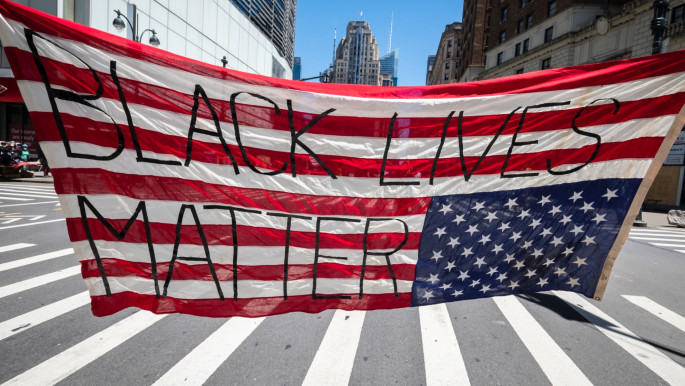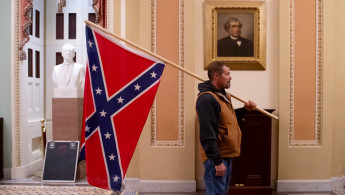Is this the end of Trumpism or the beginning of an American insurgency?
But here we are – with an exuberant base of followers that has in some cases risked their health and safety to attend large-scale rallies, who have lost jobs and personal relationships for sharing bigoted remarks by their leader, and most recently have taken part in a deadly domestic invasion of the US Capitol Building.
Will these trends continue? It's hard to predict without first asking what will happen to Trumpism, the loyal following of outgoing president Donald Trump that comprises a loose assortment of adherents to white nationalism, science scepticism, and indignation at the mainstream media.
"Trumpism as a term will stay around because it's so vague. When you have a demagogic politician, holding rallies and rejecting the idea of global warming, the word will come up. But Trumpism as a coherent political movement, that's different," Roger Griffin, Emeritus professor of modern history at Oxford Brookes University, told The New Arab.
"Is Trumpism coherent enough as an ideology, as a mobilising ideology, to outlive Trump?" Griffin asks, reviewing historic examples of leaders' names whose movements have outlasted their own political careers: Peronism, Thatcherism, Leninism, to name a few.
"Trumpism as a demagogic style of politics will live on. People will say: that's a bit Trumpist. As a movement, it's very dubious," he says. "There is no ideology. He's too intellectually stupid."
 |
Is Trumpism coherent enough as an ideology, as a mobilising ideology, to outlive Trump? |  |
A future for strongmen or a return to 'normalcy'?
But what about beyond the use of his name? Will his base continue to back him, or will enough of them support the core issues that he has championed? That's a question that will depend on a number of factors, such as how much of his party's support he loses in his final days in office, how effective Joe Biden is as president and how well the Democratic Party does in the 2022 midterms.
"There will be a lot of people who will refuse to accept Biden as the president. We won't know until the midterm elections. That will be a test of the direction of the country," says Robert Paxton, Mellon Professor Emeritus of social sciences at Columbia University.
The good news for Biden right now is that he "has things in his favour," says Paxton. "The rhythm is going upward. He can inject money into the economy. There will be a stimulus and job formation."
 |
|
| Read more: Close the door on your way out, Mr Trump |
On the other hand, he says, "There are factors pushing in the other direction. There are people out there that reject traditional leadership and want a strongman. They may be with us for a long time."
Indeed, the departure of a leader does not automatically mean the end of a movement, particularly one whose roots long predate the current administration and whose future is all but certain in some form or another.
A YouGov poll taken after Wednesday's Capitol invasion found a clear political and information divide between respondents.
When asked, 'To what extent is Joe Biden to blame for the actions of those who stormed the Capitol building?' 52 percent of Republicans said Biden was to blame, while 45 percent said Biden was not to blame. When asked, 'Is Donald Trump to blame for the actions of those who stormed the Capitol building?' 28 percent of Republicans said Trump was to blame, while 69 percent said Trump was not to blame.
This major discrepancy shows just how common these views have become – not just among Trump's base, but in the Republican Party more generally.
He put GOP talking points on amphetamines and did a hostile takeover of the party, says Matthew Feldman, Professorial Fellow at the University of York and Director of the Centre for Analysis of the Radical Right.
However, he points out, a hostile takeover "is a takeover of exposed assets." In other words, the party and the country had visible vulnerabilities that could be exploited.
 |
There will be a lot of people who will refuse to accept Biden as the president. We won't know until the midterm elections. That will be a test of the direction of the country |  |
An American and international reality
A common observation of Trumpism, particularly after the recent invasion of the Capitol, is that it is unprecedented, an aberration or un-American. History shows that none of these are the case.
"It's totally different from the story America likes to tell itself. It's a story you can tell yourself," says Feldman. "The lack of peaceful transfer of power doesn't address the Civil War."
For much of the world, and for much of America, Trump is quintessentially American, having managed to tap into grievances that his competitors had overlooked, speaking in a simple and straightforward language (even if inaccurate – around 30,000 false claims since he assumed office, per The Washington Post) that resonated with enough voters to propel him to power.
At the same time, Trump's political tactics are not uniquely American either and are part of a larger worldwide trend of strongman leaders that have come to power in recent years.
"I think the place to start is to see it as a version of right-wing populism sweeping the world," says Sheri Berman, professor of political science at Barnard College in New York. She notes that one important difference with far-right leaders elected in Italy and Austria is they have been checked by having to form a coalition government.
 |
|
| Read more: For US progressives, the fight has only just begun |
"In Italy and Austria, the far-right wing that ended up in a coalition government weren't able to reshape party systems like they were able to in the US."
The American roots of Trumpism can be traced back to Andrew Jackson, the seventh US president, who energised his supporters by railing against the elites, implementing pro-white policies that harmed Native Americans, and earning the nickname "King Mob" for his populous stunts.
Traits of Trumpism can also be seen in state politicians of the south, such as Ben Tillman, who served as governor of South Carolina in the late 1800s, says Stanley Payne, emeritus professor of history at University of Wisconsin-Madison.
"There have been presidents who have had a basic popular base, but none that would behave or talk as carelessly as Trump," says Payne. "The nearest you could come are the southern demagogues at the state level. But they were more coherent and consistent."
With time, they grew into their jobs. "After a while, they were professional politicians." Trump, on the other hand, has "no consistency. That makes him transitory." He adds, "If he hadn't been so incoherent, he might have pulled it off."
 |
The Trump base is genuine. It has some significance. It's not going to go away. On the other hand, some Trump people will withdraw from politics. They're not civic actors |  |
Who would fill this potential leadership void?
Indeed, in the end, it might not be his flagrant racism, his hands-off response to the coronavirus, or his shameless lies that lead to his undoing, but instead his lack of discipline.
This then begs the question: could someone with the same policies but better discipline replace Trump? In theory yes, but in reality there appears to be no heir apparent. Of the top potential contenders in the Republican Party, none has ever had a similar following as Trump.
"There's [Josh] Hawley, [Tom] Cotton and [Marco] Rubio, but they all have a long way to go to generate a national constituency," says Payne. "There's not a single one of them who looks like an heir apparent."
Moreover, among Trump's most ardent followers are those who had not previously participated in elections, and they could just as easily skip the next elections.
 |
|
| Read more: The role of Black Muslims in America's fight for racial justice |
"The Republican Party basically is divided between moderates and Trumpians," says Payne. "Putting it back together will be hard. The Trump base is genuine. It has some significance. It's not going to go away. On the other hand, some Trump people will withdraw from politics. They're not civic actors. They have strong feelings, but they're perfectly capable of withdrawing in the next election."
It will take effort to reunite the Republican Party. But in the end, it will come back as it works to engage at least two general bases, its mainstream and now its disaffected Trump voters. This could create an opening for Biden, giving him the opportunity to connect with new constituents.
A fresh start?
With Biden, says Paxton, "We're making a fresh start. It's an optimistic moment. He may have trouble connecting with the disaffected. He connects OK with moderates with centrist opinions."
The challenge, he says, is "to be able to speak to some of Trump's public. I don't know how you'd do it. Maybe he could take a tour of the country and listen to people in West Virginia and Michigan."
As for Trump's more extreme supporters, it appears that he has given them a voice, one that before his election would have likely crossed a line of civility. Will their energy disappear if he does? Having a leader certainly allows them to unite and find one another.
"Support for Trump in the far-right, the sort of stuff that came out in Charlottesville, they are going to be his most lasting legacy," says Griffin. "He has created a bit of cohesion in the far-right, which now have a martyr. They can now say: look, Trump really was elected for a second time."
 |
Support for Trump in the far-right, the sort of stuff that came out in Charlottesville, they are going to be his most lasting legacy |  |
While Griffin believes Trump's presidency has emboldened both the far-right and the far-left, he also believes there's a potential opening for centrists.
"They need to collaborate on crucial issues," he says. "America has lost four years. A lot of states have adopted green policies. Trump has been so appalling. Even though he's helped polarise America, he has created a space for centrist politics. This backlash against Trump is the true long-term legacy of Trump."
Right now, Griffin is focusing on what he sees as the resiliency of American democracy. "The fact is they went back and confirmed the election of Biden after the invasion of the capital," he says.
"If the events had happened in an unstable dictatorship, there would have been martial law. American democracy lived through this crisis. What prevailed were the basic principles of liberal democracy."
He cautiously adds, "The next thing to watch is the inauguration."
Brooke Anderson is a freelance journalist covering international politics, business and culture
Follow her on Twitter: @Brookethenews



